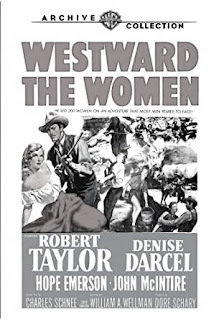Ginger Dehlinger's Blog, page 2
January 2, 2023
Hard or Soft G
Last week I happened upon a newspaper article about techniques for teaching phonetics to children. I hadn’t planned to read the article until my name, in italics, caught my eye.
The article focused on how “g” is pronounced when it is the first letter in a word. According to the writer, the “juh” sound for the letter “g” is most often used when it precedes e, i, or y. The example cited was Gentle Ginger goes to the gym.
I grew up with the mnemonic rule of thumb for ei and ie: I before e when it comes after c, but never learned Gentle Ginger goes to the gym. Believe me, I would have remembered that little ditty. The article went on to explain that a hard “g” is used when it precedes a, o and u.
I learned these “g” distinctions by ear, as one might say, by listening to reliable English speakers. Since this article was my first encounter with the mnemonic rule of thumb for “g”, I decided to see how reliable it was. I diligently walked my index finger through Webster’s Unabridged Dictionary of the English Language, the edition that weighs three pounds, and found many exceptions for soft “g;” whereas the rule for hard “g” was hard and fast. I excluded proper names when checking both rules.
A few, but not all, of the exceptions I found for “juh” being used before e, i, or y were gear, geek, gestalt, get, gewgaw, geyser, gibbon, giddy, giggle, gild, gimmick, girl, give, gynecologist.
My intention was not to criticize. I am delighted this rule is being taught to children because when gesture is pronounced with a hard "g" it is (for me) like fingernails on a chalkboard. The ge in gesture follows the “juh” rule.
Mnemonic devices are fun. The rule of thumb containing Ginger is fine. It's probably easy for young people to remember. I wish they would use one I came up with, however, because it includes gesture.
When my gesture made the giant gyrate, I gave him some gum.
G
December 11, 2022
Retracing a Few Family Footsteps in Colorado
Writing my historical novel Never Done familiarized me with my father’s side of the family. It also piqued my curiosity about the many places in Colorado my great-grandmother lived. In 1918, I decided to visit some of those towns. My sisters wanted to go with me, so the three of us met in Durango, rented a car, and drove all the way to Naturita, making stops in Silverton, Telluride and Ophir.
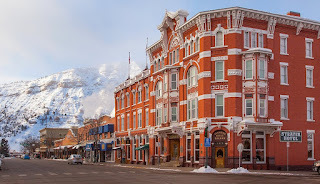
I made reservations for us to stay at the historic Strater Hotel in Durango. Built in 1887, it is the same hotel Clara admires in Never Done when she and Vincent are living there. In chapter 52, Clara is a guest there for a couple of nights. Staying in the hotel was, for me and my sisters, like staying in a museum. All of the walls were wallpapered in old-fashioned prints. Most of the trim was real wood and hand carved. Beautiful antique furniture decorated the lobby as well as the guest rooms.
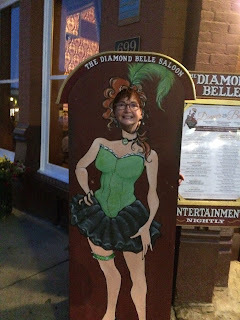
Inside the hotel is the famous or infamous Diamond Belle Saloon. In my story, Vincent spent some time there. My sisters and I had a dish of ice cream and took pictures of one another outside.
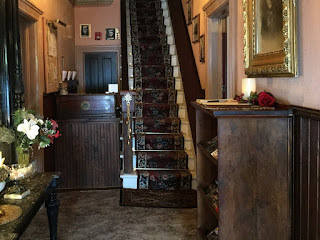
Day two we drove to Silverton. This is a hair-raising drive most people make this trip by train, but the Durango-Silverton Narrow Gauge Railroad had been shut down due to a wild fire. We stayed at Alma House, built in 1898 and converted into a boarding house for miners in 1902. With its carefully restored interior, antique furniture, and quaint touches like coffee and pastries outside our door first thing in the morning, staying there gave the impression of stepping back in time. Betty and Albert also served us an amazing miner’s breakfast that was delicious.
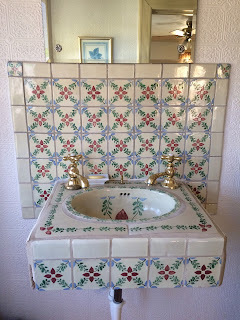
one of the sinks in Alma House
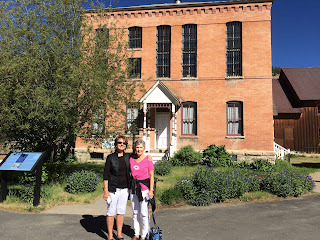
Our grandmother, Anna Colmer Grimes, was born and raised in Silverton. We visited the court house to see if we could find where she lived. We looked through many records, found several with her parent’s names on them, but no home address. In Never Done, Anna is the character Emma, married to Charley.
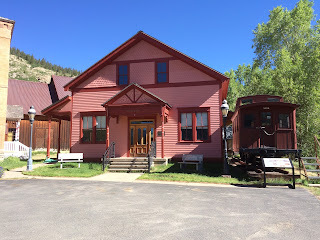
We also visited the San Juan County Historical Society’s Mining Heritage Center. The exhibits, realistic underground tunnel, and mining equipment gave us a good look at what it took to extract silver ore.
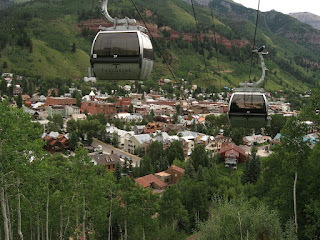
We spent two nights in Telluride. Once just another mining town, this one is now an upscale tourist mecca. Staying there didn’t give us the same historic feel we experienced in Durango and Silverton, but we had fun shopping and riding the gondola.
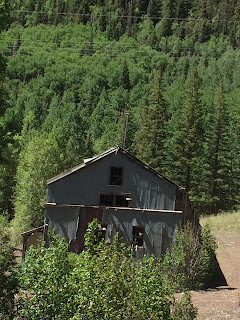
While we were in Telluride, we drove to what was once the small mining community of Ophir Loop. Not much remains of this grubby little place where, in Never Done, Clara manages a hotel.
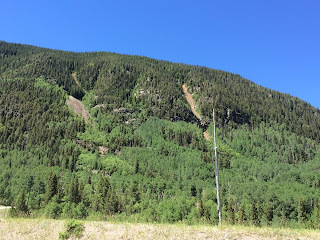
Near the abandoned site once called Ophir Loop, we saw the scars that remain on Silver Mountain, deforestation created when the Silver Bell Mine dumped tons of crushed rock and other tailings down its sides. Mining was eventually halted because of it.
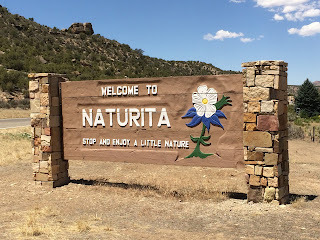
Finally, we reached Naturita where our father was born. We hadn’t been to the small town since we were too young to remember We were hoping to find the house our father was born in, but didn’t have enough information. However, with the help of the local librarian, we did find the hotel our father’s parents (Charley and Emma in Never Done) managed.
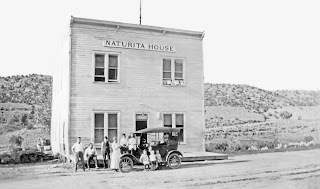
Here is a picture taken in 1918 of the hotel as it looked then.
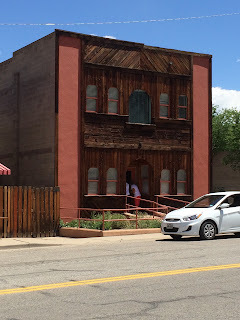
This was how the renovated hotel looked when we saw it. The false front’s arched cutouts hide the original rectangular window frames. Though we brought a picture of the original hotel with us, we never would have connected it to this one if we hadn't had help.
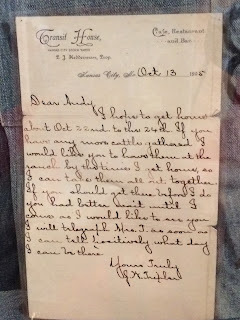
Naturita has a small museum. The entire collection is housed in one room, and it was in that room we found something even more exciting than the hotel. There, in a glass case, was displayed a letter written in 1895 by our great-great grandfather, Jonathan Wainwright Tripler (Albert in Never Done). J.W. Tripler was in the cattle business in Naturita. This amazing find gave me goosebumps, made me wish I had done more as a history major than just write about it.
October 8, 2022
The History Major
I was a history major at the University of Oregon. When I graduated, applicable careers for a history major were limited unless you taught the subject, which I did at the high school level for six years. Then, after divorcing my first husband, I moved to the East Coast and spent the rest of my Jill-of-all-trades career hopping from job to job, looking for, but never finding, work that held my interest longer than six or seven years. None of the positions I held were remoted related to my major.
Then, I retired. Suddenly I had time to write something other than business letters, reports, or training manuals. I could set my own deadlines, choose topics limited solely by my imagination, and though I had abandoned my major for 35 years, it crept into much of what I wrote.
The story in my first novel, Brute Heart, takes place in the 1970’s and 80’s. In it, I expose the challenges of a young woman trying to gain acceptance as a veterinarian in agrarian communities unaccustomed to females in that profession. I also describe the highly complicated regimen imposed on people during the early years of Oregon’s Death with Dignity Act.
Never Done, my second novel, is set in Colorado from 1885 to 1919. Based on the life of my great-grandmother, the story is about a woman's perseverance as she raises a family and moves from cattle country to mining towns, witnessing industrialization, World War I, and the Spanish flu epidemic.
“A nation that forgets its past has no future,” said Winston Churchill. I believe this blindness to the lessons of history is taking place in the United States right now. Call me a paranoid geezer, but I would describe most Americans as complacent, almost as ignorant of the real world as they were prior to World War I, especially when it comes to Russia, North Korea and China. Not having a strong President adds to the danger of being drawn into another large-scale war.
American parents are also betraying an entire generation by turning their backs on even the mildest version of “spare the rod, spoil the child,” mollycoddling too many of today’s children, failing to prepare them for the realities of life. I blame this on the alarming increase our country is experiencing in drug use and suicides among young people.
I can’t pin a rose on me, however, since I rarely tackle contemporary issues in my writing. Instead, I hunker down in my comfort zone which is writing about my own history or that which preceded me. Those years definitely weren’t problem-free, but at least most people who lived them were better prepared to deal with poverty, disease, war, and natural disasters.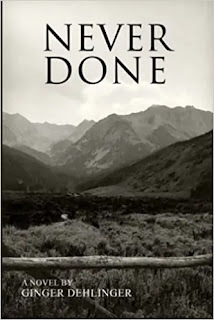
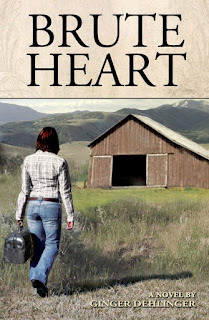
September 9, 2022
I Before E
Remember learning “I before E except after C” in grade school? I recently came across a longer version of this little ditty that includes other exceptions. The poet bug in my veins fiddled with it some to make it rhyme better.
I before E
except after C
or when sounding like EYE
as in HEIDI and STEIN
or spoken like SAY
as in NEIGHBOR and WEIGH
Most Americans were taught to memorize the first part of this poem. Our teachers probably thought getting us to spell a few I-E words correctly was at least a start given the vagaries of English. Now, of course, students can just ask Siri or Alexa.
There are tons of exceptions to the I-E "rule", partly because English is so wonky, partly because our language is sprinkled with words from many other tongues. Here's an example to illustrate some of these exceptions, one that would totally frustrate ESL students.
The heinous foreigners cried heigh-ho as they seized their meister’s sleigh and eight feisty reindeer.
Want a little refresher spelling test? Insert the letters E and I in the correct order in the following words. Have fun! 😊
1. s - - z e
2. n - - t h e r
3. r e c - - v e
4. h - - g h t
5. f r - - n d
6. b r - - f
7. d e c - - v e
8. l - - s u r e
9. m I s c h - - f
10. w - - g h t
11. - - g h t
12. r e c - - p t
13. s l - - g h t
14. f r - - g h t
15. t h - - r
16. n - - g h b o r
17. c - - l I n g
18. s h r - - k
19. r - - g n
20. p - - c e
August 4, 2022
August 21 is Poet's Day
When I retired with the intention of doing what I call serious writing, I started slowly by taking an online children’s literature course. Although none of my writing assignments ended up in Brute Heart, I moved from playing with children’s stories to self-publishing my first novel.
To hone my skills and feel more like a writer, I joined Central Oregon Writer’s Guild. This led me to a critique group that gave advice as I slogged through the research and writing that went into my second novel, Never Done. Two members of my critique group were poets who shared their work every other week. I learned a lot from them as I read what they wrote and offered suggestions, tentative ones, to be sure. I grew a bit bolder and wrote a few poems of my own which they graciously critiqued. I wrote about whatever came to mind, some poems celebrating nature, others whimsical. I also read Sylvia Plath, Mary Oliver, Edna St. Vincent Millay, which gave me a greater appreciation for the genre.
Due to job changes and members moving out of town, after five years, the group disbanded. I kept writing. “No more novels,” I declared, as I concentrated on short stories and poems. I guess I had become a poet and didn’t know it, because as of this August (2022) 29 of my poems have been published, some in online journals, most with other poets in soft cover anthologies. I've been told my poems are easy to understand. More prose than traditional poetry, they flow freely, rarely rhyme.
Since August 21 is Poet’s Day, I decided to celebrate another poet by sharing the poem I read at my mother’s graveside service in 2016. I did not write this poem, but wish I had.
Although You're Gone
Although you're gone, I'm not alone,
And never shall I be,
For the precious memories of the bond we shared
Will never depart from me.
Our love surpassed the ups and downs
And helped us along the way,
And that same love will give me strength
To manage this loss each day.
On my mind and in my heart,
Mom, you’ll forever be,
For as much as I am a part of you,
You are a part of me!
© Shannon Walker
P O E T R Y
July 6, 2022
Naming Characters
One of the many challenges faced when writing fiction is naming characters. Names should be appropriate for the historical period and country in which the story takes place, not too common, but not so unusual it becomes the central focus ("A Boy Named Sue," for example).
When writing Brute Heart, I used a map of Oregon--not the simple version below, but one that included topographical as well as political designations. I used the map to choose the first and last names of every character in the book, even those briefly mentioned. Since I didn't want my system to be readily apparent, I steered clear of names like Willamette, Multnomah, Columbia, etc.
It has probably been a long time since you read Brute Heart, but for a little trip down memory lane, below is a list of the main characters and their namesakes.
Jordan Miller
Jordan Valley is a small town in SE Oregon near the Idaho border. Miller Lake--small lake north of Crater Lake in Klamath County.
Annie
Annie Creek--a tributary of Wood River that flows out of Crater Lake
Cooper
Cooper Mountain rises 700+ feet over Washington County (near Aloha); Cooper Creek is in Douglas County.
Jude
Jude Lake in Marion County
Dusty
Dusty Saddle Canyon located north of Pendleton
Perry
Perry--a community in Union County near LaGrande
McKenzie Scott
The McKenzie River is a tributary of the Willamette River; Mt. Scott rises on the SE flank of Crater Lake.
Morgan Scott
There are two Morgans in Oregon, one north of Heppner and one west of Roseburg (both are quite small).
Kimberly
Kimberly is a small town situated north of the John Day Fossil Beds right on the border of Wheeler and Grant counties.
Riley Palmer
Riley is a community in Harney County west of Burns; Palmer Creek is a tributary of the S Yamhill River located in northwest Oregon.
Parker
Parker--a community located in Polk County south of Monmouth
Leona
Leona--a community in Douglas County between Reedsport and I-5
Drew Murphy
Drew--a small community located in Douglas County; Murphy, another small community, is located in Josephine County in the Applegate Valley
Kent Warner
The town of Kent is located in Sherman County between Shaniko and Grass Valley; Warner Valley is in the eastern part of Lake County.
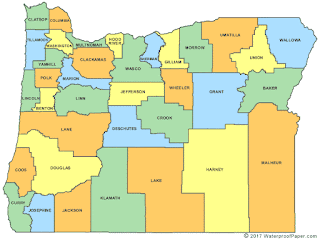
June 5, 2022
The Goose Girl's New Ribbon
Much of my writing is inspired by family history. My latest venture into self-publishing, The Goose Girl's New Ribbon, is a good example. Gleaned from my Bohemian mother in bits and pieces, it's a story that illustrates what it was like for a farm family in South Dakota trying to survive the Great Depression. Since the protagonist is a ten-year-old girl, and the story is historically accurate, I thought I might find a children's magazine eager to publish it.
After I stopped writing and counted the words (over 9,000) I realized few children's publications would be interested in something that long. However, I liked the story so much, unusual for me who usually finds fault with everything I write, I decided to self-publish it as a children's book, most likely my only children's book.
I love to write, don't like to promote. About the only time I make an effort to sell my books is at holiday bazaars. I sometimes tell myself I'm too old to be hawking my work, but I enjoy these small "craft fairs" where the other vendors are friendly and the people who stop by are looking for Christmas gifts. Covid stopped these events for two holiday seasons. This year, when November finally rolls around, I will have a children's book on my table along with my two novels and a couple of anthologies.
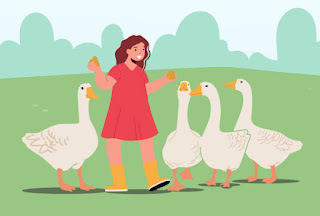
April 7, 2022
"Walks into a Bar" Jokes
Which type of joke have you heard most often—a “blond” joke or a “walks into a bar” joke?
Below are some clever “walks into a bar” jokes that are also useful examples of terms used to describe features of the English language. I would credit the writer if I knew who it was.
After joke #10 is a poem I wrote about being in a bar. Those of you who are familiar with my writing will say—What? This isn’t the kind of poem she usually writes. That is true, but I had a lot of fun writing it. 😊
An Oxford comma walks into a bar where it spends the evening watching TV, getting drunk, and smoking cigars.A dangling participle walks into a bar. Enjoying a cocktail and chatting with the bartender, the evening passes pleasantly.
A bar was walked into by the passive voice.
A malapropism walks into a bar, looking for all intensive purposes like a wolf in cheap clothing, muttering epitaphs and casting dispersions on his magnificent other, who takes him for granite..
Franklin Gothic and Comic Sans walk into a bar. The bartender says, “Get out—we don’t serve your type.”A mixed metaphor walks into a bar, seeing the handwriting on the wall but hoping to nip it in the bud.A synonym strolls into a tavern.A cliché walks into a bar—fresh as a daisy, cute as a button, sharp as a tack.
A verb walks into a bar, sees a beautiful noun, and suggests they conjugate.A gerund and an infinitive walk into a bar, drinking to forget.
Feed the Head
I walked into a bar with my head under my arm.
No blood—
just a flat manikin neck
between my shoulders.
I sat my curly noggin on the stool next to me.
‘I can’t see the TV,’ it whined,
mumbling something under its breath
about the evening news.
‘Margarita, no salt,’ my head told the bartender.
The pale green liquid arrived with a long straw,
and my mouth wolfed it down
like a parched camel.
The tavern teemed with zodiac animals.
A Taurus poked my cheek to see if I was real;
fell back with a shriek
when I rolled my eyes.
‘You gotta see this,’ Taurus said to Scorpio.
Aries sampled my salt lick neck;
got a taste of my fists
though my aim suffered some.
By our third margarita my head was showing off,
harmonizing with Prince, Cher, Willie,
issuing from the juke box
and doing Sylvester Stallone impressions.
‘What does your other half do?’ asked Leo.
‘He’s my body guard,’ said my head.
For my turn in the spotlight
I flexed my biceps, did some squats.
The happy hour circus muscled closer.
When Pisces began gasping for air
I paid the bartender,
picked up my head and left.
‘We’re not done here, are we?’
my mouth whispered to my armpit.
‘Only the worm in the tequila knows
how to survive in this land of lunacy.’
Ginger Dehlinger
March 6, 2022
Heteronyms
Heteronyms are words that are spelled the same but have more than one meaning. They are one of many idiosyncrasies in the English language that make it a challenge to master. Listed below are a few examples. The haphazard nature of heteronyms becomes even more apparent when they appear in the same sentence.
The insurance card the INVALID showed to the receptionist was INVALID.
I winced when the nurse WOUND a bandage around my WOUND.During mating season, a buck DOES bizarre things when DOES are around.
I shed many a TEAR when I saw the TEAR in my new blouse.
A farmer needs rich soil to PRODUCE organic PRODUCE.
The recycler's bins were already so full of REFUSE, he had to REFUSE what I brought.
I was too CLOSE to the cupboard door to CLOSE it.
The Captain could LEAD us to our bivouac if we would just get the LEAD out.
I did not OBJECT to the ridiculous OBJECT he gave me for Christmas.
No time like the PRESENT, the young man decided, to PRESENT his girlfriend with a PRESENT.
Let's face it - English is verbal insanity..
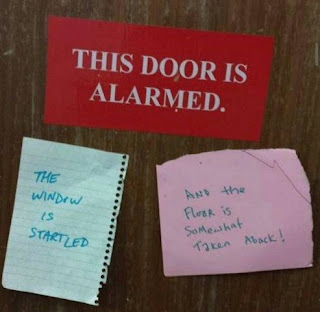
February 9, 2022
Westward the Women
Two weeks ago, I happened upon Westward the Women, a movie I hadn’t seen since I was about eight years old. I grew up a fan of the Western genre, and back then there were plenty of Westerns being filmed to keep my fire lit. At the age of five, according to my mother, my boyfriend was Roy Rogers. One day she saw me making mud pies and asked who the pies were for. “Roy,” I answered. A year later I carried my lunch to school in a Roy Rogers lunch pail.
Many western-themed movies in the 50’s and 60’s treated America’s westward expansion lightly and tritely. There was always singing and dancing around a campfire and an attack by indigenous people which the natives usually lost. Westerns featured male actors more than they did female, and actresses along for the ride usually had well-coiffed hair and pretty dresses that were clean and unwrinkled.
Westward the Women was an exception. This movie about a wagon train of mail order brides traveling to California was filmed in black and white, one way to highlight how dirty and treacherous such trips were. It has since been colorized, but for me, blue skies and blue eyes are a distraction. These women got muddy, sweaty, sunburned, broken and bloodied. Their hair was usually a mess, and their dresses looked like rags by the time they reached California. The stark realism in the black and white version I saw as a child may be why this movie made such an impression it stuck with me most of my life.
Movies filmed years later such as Meeks Cutoff (2010) also show how strong women had to be to make the endless trek across deserts and mountains. I have seen two episodes of 1883 since it was released this year, and thus far it appears to have even more realistic roles for women than Meeks Cutoff or Westward the Women.
Another accurate depiction of women pioneers can be seen at the National Historic Oregon Trail Interpretive Center located in Baker City, Oregon. In the museum’s living history displays, the hems of the women’s dresses are caked with dirt as they walk alongside, not ride in covered wagons. Painstaking details, such as the fatigue etched on mannikin pioneer faces and artificial flies perched on artificial oxen dung, make this replica of the true Oregon Trail experience worth a trip to Baker City.
